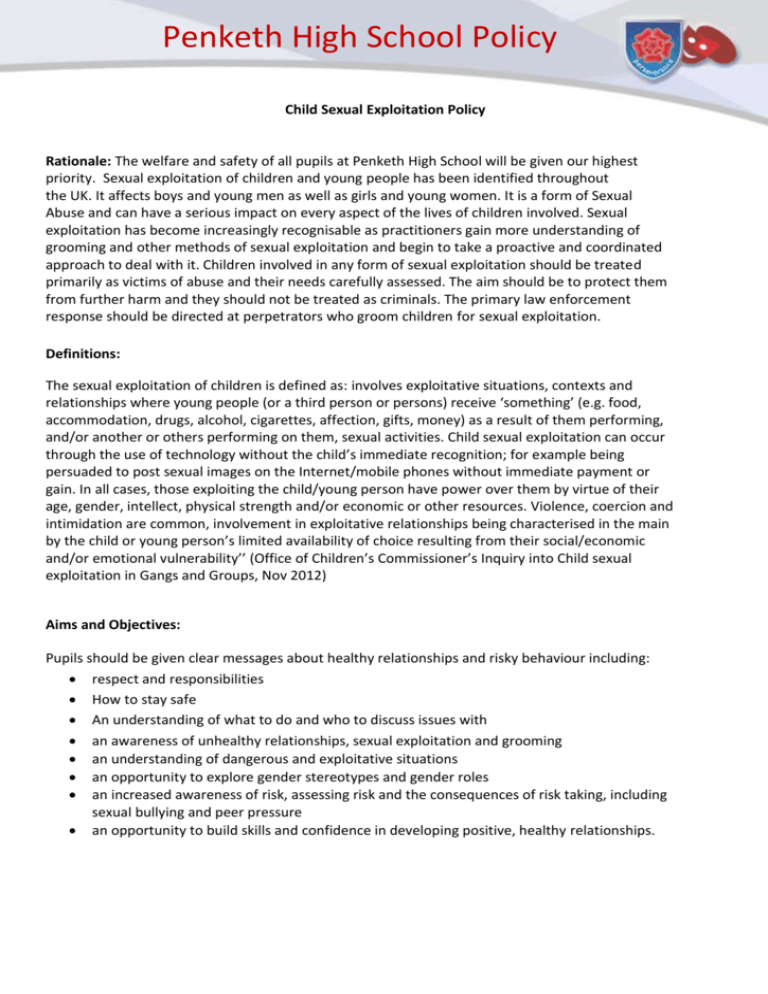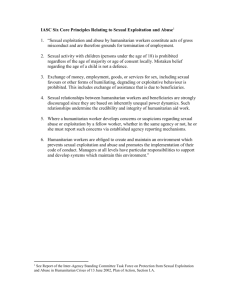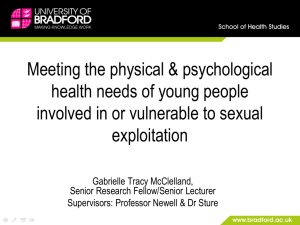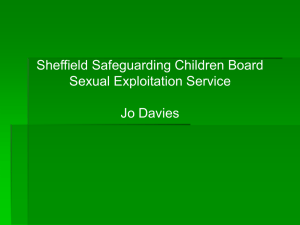Policy Name
advertisement

Penketh High School Policy Child Sexual Exploitation Policy Rationale: The welfare and safety of all pupils at Penketh High School will be given our highest priority. Sexual exploitation of children and young people has been identified throughout the UK. It affects boys and young men as well as girls and young women. It is a form of Sexual Abuse and can have a serious impact on every aspect of the lives of children involved. Sexual exploitation has become increasingly recognisable as practitioners gain more understanding of grooming and other methods of sexual exploitation and begin to take a proactive and coordinated approach to deal with it. Children involved in any form of sexual exploitation should be treated primarily as victims of abuse and their needs carefully assessed. The aim should be to protect them from further harm and they should not be treated as criminals. The primary law enforcement response should be directed at perpetrators who groom children for sexual exploitation. Definitions: The sexual exploitation of children is defined as: involves exploitative situations, contexts and relationships where young people (or a third person or persons) receive ‘something’ (e.g. food, accommodation, drugs, alcohol, cigarettes, affection, gifts, money) as a result of them performing, and/or another or others performing on them, sexual activities. Child sexual exploitation can occur through the use of technology without the child’s immediate recognition; for example being persuaded to post sexual images on the Internet/mobile phones without immediate payment or gain. In all cases, those exploiting the child/young person have power over them by virtue of their age, gender, intellect, physical strength and/or economic or other resources. Violence, coercion and intimidation are common, involvement in exploitative relationships being characterised in the main by the child or young person’s limited availability of choice resulting from their social/economic and/or emotional vulnerability’’ (Office of Children’s Commissioner’s Inquiry into Child sexual exploitation in Gangs and Groups, Nov 2012) Aims and Objectives: Pupils should be given clear messages about healthy relationships and risky behaviour including: respect and responsibilities How to stay safe An understanding of what to do and who to discuss issues with an awareness of unhealthy relationships, sexual exploitation and grooming an understanding of dangerous and exploitative situations an opportunity to explore gender stereotypes and gender roles an increased awareness of risk, assessing risk and the consequences of risk taking, including sexual bullying and peer pressure an opportunity to build skills and confidence in developing positive, healthy relationships. Penketh High School Policy Implementation: Ensure that school e-safety procedures are robust and that pupils are taught online safety skills so they can identify online risks and are confident to report any concerns to school staff. The school will have links with outside agencies that will support the school in implementing this policy Identify staff training needs to increase knowledge and develop confidence The school has a named representative who works in partnership with the local safeguarding children board (LSCB). The DSP will work closely with other local specialist agencies. Lessons will be integrated into Managing Risk and Sexual Health covered in Learning for Life at KS3 and KS4 or other health and well-being programme in school The school will agree ground rules with young people, including confidentiality. Confidentiality should be maintained in line with the school policy and the child protection policy. School staff will model behaviour – be aware of values and attitudes, preconceptions and feelings and be prepared to challenge any inappropriate language and attitudes including stereotyping. School staff will recognise diversity within the teaching group and be aware of gender groupings. Consider whether mixed or separate gender groups are appropriate . Monitoring and Evaluation: Attendance officers monitor weekly tracking sheets to identify irregular patterns of attendance Vice Principal – Climate for Learning will feed back initiatives and information from the LSCB Assistant Principal (currently DSP) –will ensure that all staff receive training and information on how to recognise the signs of Child Sexual Exploitation. Assistant Principal – will develop links with local services for sexually exploited young people, and invite representatives to school to take part in lessons or assemblies. School staff will be a source of support for parents who have concerns about their child’s behaviour, appearance or friends who are not part of the school community. They will help parents to access appropriate agencies for further help. Links: the attendance policy should be should be read in conjunction with the Safeguarding Policy, Attendance Policy and Child Protection Policy Penketh High School Policy Responsibilities: the following have responsibilities:] Principal: To ensure that the school is compliant with legislation and to report to the governing body Vice Principal – Climate for Learning: To ensure that school develops strong links with outside agencies including the LSCB to improve awareness, understanding and recognition of CSE. Assistant Principal – to ensure staff receive information and are trained up on the most recent documentation in CSE and to ensure processes are followed that protect pupils from CSE Heads of House: To raise awareness of CSE through school assemblies Form Tutors: To recognise the signs of possible CSE and pass this information without delay to the DSP. All staff- To recognise the signs of possible CSE and pass this information without delay to the DSP. Attendance Officers: To ensure that parents are informed of the pupil’s absence and work closely with the LA Attendance Officer and the school DSP where there is a cause for concern Governing body: To review the school’s Child Sexual Exploitation Policy and to ensure the school is compliant with legislation. Date of Approval by Governors: 15th January 2015 Next Review Date: January 2017



